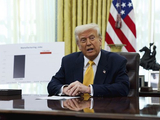Diplomatic Dynamics; Legal Precedents; Strategic Shifts; U.S.-China Relations; Zelensky's Maneuvering; China's Innovation

Diverse Perspectives on Trump's Visit to the UK: Diplomatic Moves and Public Reactions
Recent events show that U.S. President Donald Trump's visit to the UK has stirred significant attention and reactions. Xinhua reports on the protests that greeted Trump's arrival, with nearly a hundred demonstrators gathering outside Windsor Castle in London. The protestors, organized by the group 'Stop Trump Coalition,' carried signs with messages like 'Hate Makes No Country Great' and chanted slogans such as 'Go Home Trump' and 'Trump Not Welcome.' This indicates a considerable public dissent against Trump's visit, reflecting broader tensions in U.S.-UK relations.
In contrast, United Daily News highlights the economic aspects of the visit, noting the commitment of American companies like Microsoft and OpenAI to invest over $400 billion in the UK. These investments, aimed at bolstering technology infrastructure, align with UK Prime Minister Rishi Sunak's efforts to strengthen UK-US relations and drive technological growth. This illustrates the significant economic interests underpinning the diplomatic engagement.
Meanwhile, another article from United Daily News emphasizes the ceremonial and diplomatic nature of Trump's visit, describing it as a historic second state visit. The report notes the elaborate preparations by the British monarchy and government, including a royal welcome and state banquet, underscoring the importance of maintaining strong ties with the United States.
Sina, on the other hand, provides a concise overview of the visit, focusing on the itinerary and the significance of the state visit as part of broader diplomatic efforts. It highlights the strategic discussions scheduled, suggesting a focus on strengthening bilateral agreements.
These developments indicate a multifaceted narrative surrounding Trump's visit to the UK. While Xinhua captures the public protests and dissent, United Daily News and Sina focus on the diplomatic and economic dimensions, reflecting differing priorities and perspectives. The coverage suggests a complex interplay of public sentiment, economic interests, and diplomatic protocols in shaping the narrative of this high-profile visit.
Divergent Narratives on the Charlie Kirk Shooting Case
The recent indictment of Tyler Robinson, accused of murdering Charlie Kirk, has been covered by multiple news outlets, each offering a unique perspective on the event and its implications. Xinhua News (news.cn) presents a straightforward report, detailing the charges against Robinson, including severe allegations such as aggravated murder and illegal firearm use, potentially leading to the death penalty. The article emphasizes the legal process, highlighting the initial accusations and the gravity of the charges without delving into the personal motivations behind the crime.
In contrast, United Daily News (udn.com) provides a more narrative-driven account, shedding light on Robinson's alleged confession to a cellmate and his perceived grievances against Kirk. This piece explores Robinson's personal communications, suggesting a complex web of motivations tied to his political and social beliefs, including support for LGBTQ rights, which may have contributed to his actions. This approach offers readers a glimpse into the possible psychological and ideological factors at play.
Liberty Times (ltn.com.tw) focuses on the procedural aspects of the case, confirming the charges and the prosecution's intention to seek the death penalty. The report underscores the prosecutorial diligence, noting the evidence collection process and the formal legal steps taken. This publication leans towards emphasizing the judicial proceedings and the seriousness of the accusations.
These varied narratives demonstrate differing editorial priorities: Xinhua News opts for a factual and concise legal overview, United Daily News delves into the psychological and ideological dimensions, and Liberty Times concentrates on the procedural and evidentiary aspects of the case. Together, they paint a multifaceted picture of a high-profile legal battle, reflecting the complexity of interpreting motives and justice in a politically charged environment.
Brazil's Former President Bolsonaro Fined for Racist Remarks
Recent events show that former Brazilian President Jair Bolsonaro has been fined for making racist remarks during his presidency. According to Xinhua, Brazil's southern Rio Grande do Sul state court ordered Bolsonaro to pay 1 million reais (approximately $189,000) for collective moral damages caused by his comments. The court ruled that Bolsonaro's remarks during his term violated Brazil's societal values and harmed public interests, constituting collective psychological damage.
These developments indicate a significant legal precedent, as noted by CCTV. The court also required Bolsonaro to remove the offensive content from social media and publicly apologize through media platforms. This ruling underscores Brazil's commitment to addressing racial discrimination legally and socially.
The news highlights that, beyond the financial penalty, the fine will be directed to relevant institutions for social welfare purposes, demonstrating the broader societal impact of the case. Furthermore, the Brazilian Supreme Court recently confirmed Bolsonaro's conviction for electoral fraud, sentencing him to 27 years and three months, marking him as the first former president in Brazil's history to be convicted for such a crime.
It appears that both Xinhua and CCTV provide similar narratives, focusing on the legal repercussions and the broader implications for Bolsonaro's political career. However, their coverage also emphasizes Brazil's legal system's role in upholding social justice and combating racial discrimination.
Strategic Shifts in China's Hospitality and E-commerce Landscape
Recent events highlight a significant strategic shift in China's hospitality and e-commerce sectors, as reported by Sina. At a recent wine tasting event, Liu Qiangdong, the founder of JD.com, emphasized the company's commitment to avoiding price wars in the hotel industry. He expressed that JD.com's approach would be to enhance service quality rather than engaging in price competition, which can degrade service quality and compress profit margins. Liu also revealed plans for a new hotel development strategy and innovations in their commercial model.
This development indicates JD.com's broader ambitions in the hospitality sector, aiming to integrate their supply chain into a comprehensive service system that covers dining and travel. Liu's personal engagement at the event signifies a high level of strategic importance, with the company leveraging its logistics and supply chain capabilities to create a seamless consumer experience. The article notes that this approach has already shown results, with significant traffic increases and heightened consumer interest in JD.com's hospitality offerings.
Conversely, another article from Sina touches briefly on a separate topic regarding Yi Zhongtian's response to rumors about stock market activities. The source clarifies that Yi Zhongtian has not been involved in any public stock offerings, countering speculations circulating in the financial community.
These developments indicate a narrative where JD.com is positioning itself as a key player in the hospitality industry, utilizing its extensive logistics network to support new business ventures. The emphasis on avoiding price wars suggests a focus on sustainable growth and quality improvement, reflecting JD.com's strategic priorities. Meanwhile, the brief mention of Yi Zhongtian's stock market clarification serves to dispel misinformation, ensuring transparency in financial communications.
Analyzing U.S.-China Diplomatic Developments: A Focus on Trade, Technology, and Strategic Interests
Recent events show a significant intensification in U.S.-China diplomatic interactions, as illustrated by a series of articles from United Daily News (UDN). The articles highlight U.S. President Trump's anticipated visit to China, which could potentially be tied to a major trade deal involving the purchase of 500 Boeing aircraft by China. This development is framed as a crucial outcome that could be announced during the visit, signaling a potential thaw in trade tensions.
These developments indicate a strategic alignment of interests, as both nations seek to resolve outstanding trade issues. UDN reports that the U.S. strongly insists on China buying American goods, including agricultural products like soybeans, to address trade imbalances. The news highlights the ongoing negotiations over TikTok, rare earth elements, and Taiwan, which remain contentious points between the two powers.
It appears that the articles also place significant emphasis on the upcoming potential meeting between President Trump and China's President Xi Jinping during the APEC summit. The narrative suggests this meeting could serve as a diplomatic breakthrough, paving the way for future high-level discussions. The reports from UDN underscore the critical role of strategic negotiations over tariffs, manufacturing supply chains, and military cooperation in shaping bilateral relations.
The articles collectively suggest that while economic and trade issues are at the forefront, underlying geopolitical tensions, especially concerning Taiwan, persist. The U.S. is portrayed as seeking to ensure a stable supply of essential materials and to reduce tariffs that have reached historically high levels. Meanwhile, China appears interested in leveraging these negotiations to mitigate domestic economic pressures.
Overall, UDN's coverage offers a comprehensive look at the complex web of issues defining U.S.-China relations, blending economic, technological, and strategic narratives to provide a nuanced perspective on the evolving diplomatic landscape.
Zelensky's Diplomatic Maneuvering: Meetings without Moscow
Recent events highlight Ukrainian President Volodymyr Zelensky's strategic diplomatic overtures amidst ongoing conflicts. Zelensky expressed willingness to meet with U.S. President Joe Biden and Russian President Vladimir Putin without preconditions, yet he remains firm in his decision not to travel to Moscow, the capital of a country currently attacking Ukraine. This stance was reported by both CCTV and Sina, showcasing a consistent narrative across Chinese media outlets.
These developments indicate Zelensky's diplomatic efforts to engage key global leaders while maintaining a firm position against aggressors. Both sources report his rejection of Putin's proposal for bilateral talks in Moscow, citing the suggestion as a delay tactic by Russia. Zelensky's readiness to meet in any format except in Moscow underscores his strategic positioning in the geopolitical landscape.
The news highlights the ongoing complexities in Ukraine's foreign relations and Zelensky's navigation of international diplomacy. While CCTV presents the information with a focus on Zelensky's statements, Sina provides a slightly more detailed account, including prior refusals of Moscow's proposals, yet both align in emphasizing his refusal to visit Moscow. This uniformity suggests a shared editorial stance on the issue, possibly reflecting broader geopolitical perspectives.
China's Agricultural and Innovation Advances: Global Recognition and Implications
Recent events show China's significant strides in agricultural innovation and global innovation rankings, as documented by two articles from Xinhua. The first article highlights China's advances in agricultural technology, noting that the country's comprehensive innovation system has propelled it to the forefront globally. With over 800 agricultural research institutions and more than 120,000 researchers, China has developed key technologies and new genetic resources, such as high-yield rice and disease-resistant wheat, demonstrating a move towards self-reliance in critical agricultural products.
These developments indicate a coordinated national effort to improve agricultural output and innovation. The article emphasizes the establishment of modern agricultural technology systems and the enhancement of strategic scientific and technological capabilities, which align with China's broader goals of technological self-sufficiency and food security.
The second article, also from Xinhua, discusses China's leap into the top ten of the Global Innovation Index (GII) for the first time. This ranking reflects China's growing influence in global innovation, particularly in research and development, high-tech exports, and patent applications. The report from the World Intellectual Property Organization (WIPO) underscores China's leadership among middle-income economies, with Shenzhen-Hong Kong-Guangzhou emerging as the top innovation cluster worldwide.
It appears that both articles aim to highlight China's achievements in innovation, with an emphasis on the strategic integration of policy, investment, and collaborative efforts to foster a robust ecosystem. The articles collectively suggest that China's innovation trajectory is not only about technology but also about creating a sustainable and competitive economic environment. The narrative presented reflects a sense of national pride and positions China as a formidable player in the global innovation landscape.



